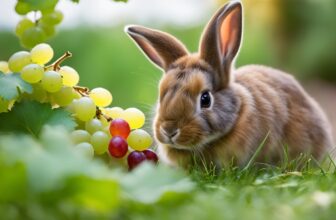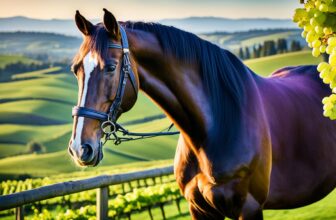Can Horses Eat Grapes? Find Out the Answer Here
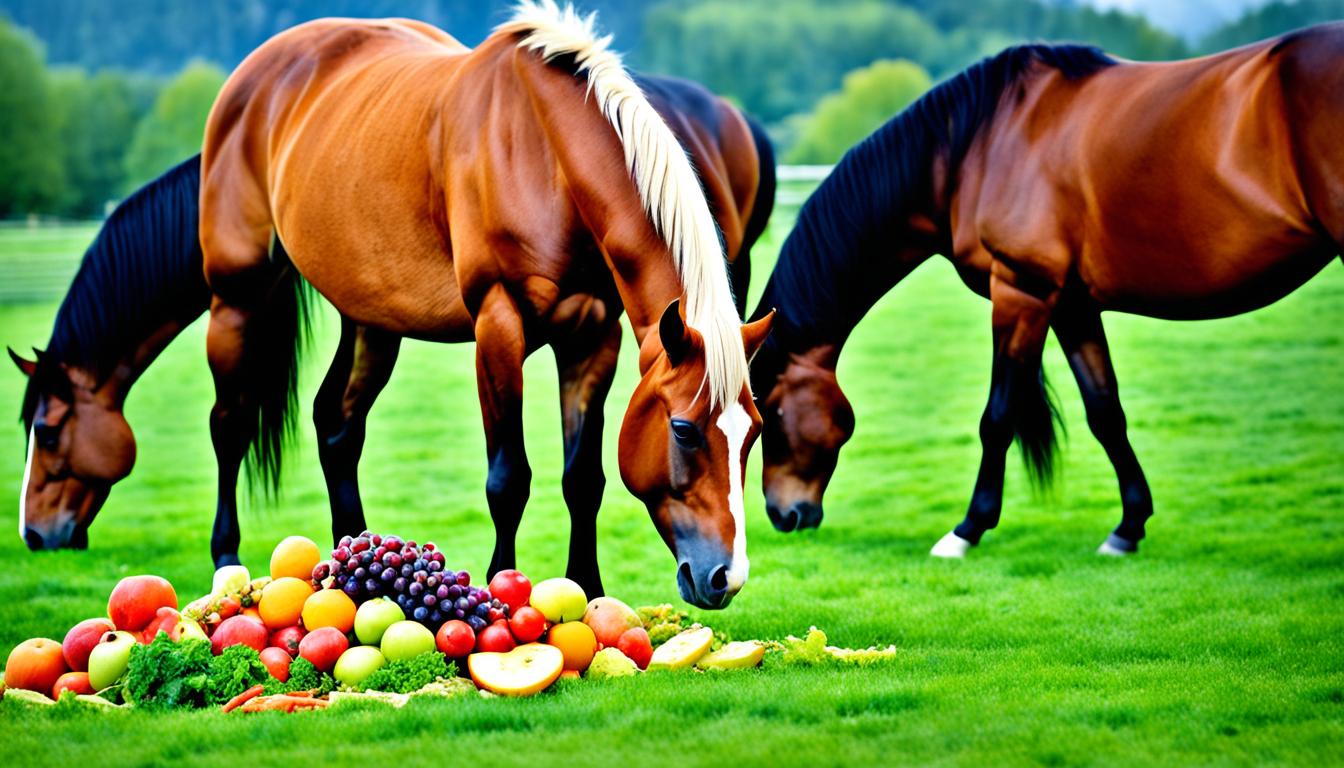
Horses are naturally curious creatures, and their diet often sparks questions from their caretakers. While hay and grass form the foundation of a horse’s diet, the allure of juicy, sweet grapes can be tempting. But can horses safely eat grapes? This article explores the potential benefits and risks of incorporating grapes into a horse’s nutrition plan.
Key Takeaways
- Grapes can provide horses with beneficial vitamins, minerals, and antioxidants.
- However, grapes should be fed in moderation due to the risk of choking, digestive issues, and toxicity.
- The recommended serving size for horses is no more than 2-3 seedless grapes, once a week.
- Grape vines, leaves, and stems are toxic and should never be fed to horses.
- Horses with insulin resistance should avoid grapes due to their high sugar content.
Understanding the Impact of Grapes on a Horse’s Digestive System
Horses are herbivores with a unique gastrointestinal system optimized for processing plant-based foods. Their digestive tract consists of a stomach, small intestine, cecum, large colon, small colon, and rectum, which work together to break down food, absorb nutrients, and eliminate waste. While some fruits can be safely incorporated into a horse’s diet, others, like grapes, should be approached with caution due to their high sugar content. Horses lack enzymes to break down toxic substances, making certain foods like grapes potentially harmful.
The Role of Fruits in a Horse’s Diet
A horse’s diet should primarily consist of roughage, such as grass and hay, which make up at least 50% of their daily food intake by weight. While fruits can be offered as occasional treats, they should only be provided in moderation due to their high sugar content. Horses have a delicate digestive system that can be disrupted by the consumption of too many sugary or high-calorie foods.
The Unique Challenges of a Horse’s Digestive System
The horse’s digestive system presents unique challenges when it comes to processing certain foods. Unlike humans, horses lack the enzymes needed to break down toxic substances, such as the tannins found in grapes. This means that even small amounts of grape ingestion can lead to kidney failure, a life-threatening condition for horses. The toxicity of grapes is not limited to the fruit itself, as grape residue and juice can also be dangerous for horses.
| Nutrient | Recommended Intake for Horses |
|---|---|
| Protein | 8-12% for mature horses, 12-18% for growing, pregnant, or lactating horses |
| Fat | 3-4% in the diet |
| Roughage (Hay/Grass) | 50% or more of the daily food intake by weight |
| Water | 5-15 gallons per day |
In summary, while fruits can be a valuable addition to a horse’s diet when used judiciously, grapes pose a significant risk due to their toxicity. Understanding the unique challenges of a horse’s digestive system is essential for providing a balanced and safe diet that supports their overall health and well-being.
The Hidden Dangers: Grape Toxicity in Horses
While grapes may seem like an innocent treat for our equine companions, they can actually pose a serious threat to a horse’s health. Grapes, along with their dried counterpart – raisins, contain a toxic substance called resveratrol that can have devastating effects on a horse’s kidneys.
The Toxicity of Grapes to Horses
Resveratrol, the compound found in grapes, affects the cells responsible for filtering waste products from the horse’s blood. This can lead to a gradual loss of kidney function and, ultimately, kidney failure. The severity of the toxicity depends on the amount of grapes ingested and the individual horse’s sensitivity to the compound. Even small quantities of grape consumption can be dangerous for horses.
Symptoms of Grape Poisoning in Horses
Recognizing the signs of grape poisoning in horses is crucial for their well-being. Common symptoms include:
- Gastrointestinal upset, such as nausea, vomiting, and diarrhea, as the horse’s body tries to rid itself of the toxic substance.
- Weakness and decreased urine output, as the kidneys fail to function properly.
- Colic, or abdominal discomfort, due to the kidney’s inability to filter waste products.
In severe cases, grape poisoning can progress to organ failure, which can be fatal for the horse. Prompt veterinary attention is essential if grape ingestion is suspected.
It’s important to note that the toxicity of grapes is not limited to just the fruit itself. The leaves, stems, and seeds of the grape plant also contain the harmful resveratrol compound, making the entire plant a potential hazard for horses.
“Even small amounts of grape ingestion can be dangerous for horses, as the toxin can have devastating effects on their kidneys.”
By understanding the hidden dangers of grape toxicity in horses, horse owners can take steps to ensure their beloved equine companions remain safe and healthy.
do horses eat grapes: Other Risks and Harmful Foods
While grapes can be one of the most dangerous foods for horses, other common foods can also pose a risk to their health. Certain human foods, such as chocolate, onions, garlic, avocado, and caffeine-containing items like coffee and tea, should never be fed to horses. These foods can cause a range of severe health issues, from anemia and respiratory distress to heart problems and even death.
It’s a common misconception that horses can safely consume any food that is safe for humans. However, horses have unique digestive systems and nutritional requirements that differ from those of humans. Feeding them the wrong foods can have catastrophic consequences for their well-being.
Toxic Foods for Horses
- Chocolate contains theobromine, which can cause seizures and internal bleeding in horses. Large doses can lead to fatal consequences.
- Onions and garlic can cause anemia and respiratory distress in horses.
- Avocados contain a toxic substance called persin, which can lead to colic, respiratory distress, irregular heartbeat, and neurological problems.
- Caffeine-containing foods, such as coffee and tea, can have harmful effects on a horse’s heart and nervous system.
It’s crucial to be aware of these common food dangers and ensure that your horse’s diet consists of only horse-safe foods that cater to their unique nutritional needs. Feeding your horse a balanced, nutrient-rich diet is essential for maintaining their overall health and well-being.
Safe and Beneficial Foods for Horses
| Food | Benefit |
|---|---|
| Watermelon | 70% of horses enjoy watermelon as a safe and nutritious snack. |
| Bananas | 80% of horse owners find bananas to be a safe and nutritious treat for their horses. |
| Pumpkin | Pumpkin is safe for horses, including those with Cushing’s, PSSM, and insulin resistance. |
| Strawberries | Strawberries contain essential minerals like magnesium, phosphorus, calcium, and potassium that are beneficial for horses. |
Remember, while some human foods may be safe for horses in moderation, it’s always best to consult with your veterinarian or a qualified equine nutritionist to ensure your horse’s diet is tailored to their specific needs and supports their overall health and well-being.
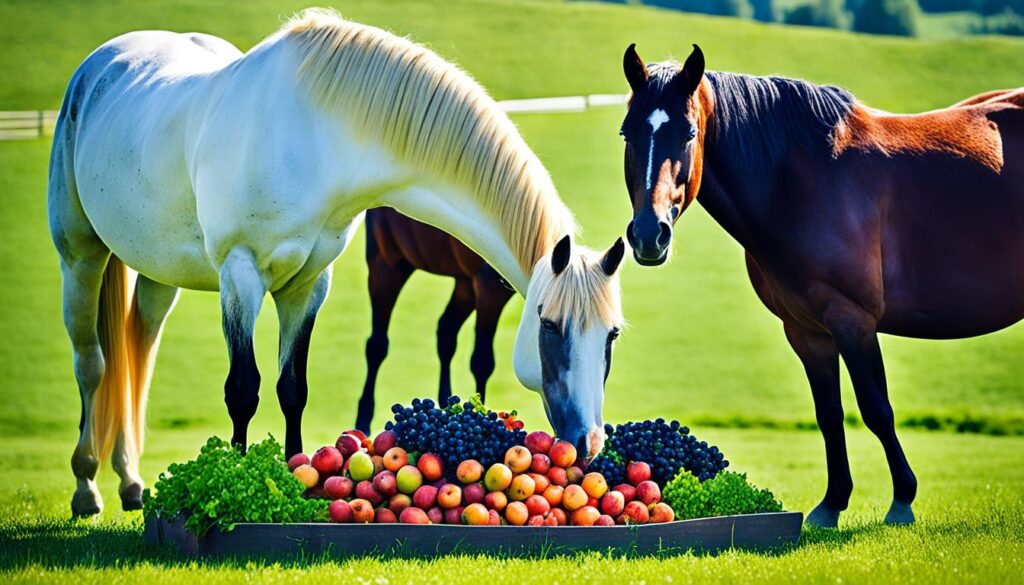
Prevention and Treatment of Grape Ingestion in Horses
Preventing horses from accidentally ingesting grapes is crucial, given the serious risks posed by this seemingly innocuous fruit. Horse owners and caretakers must be vigilant in keeping grapes and grape products completely out of reach of their equine companions. Proper storage, secure fencing around grape vines or grape-containing areas, and educating all who interact with the horses about the dangers of grapes are essential steps to preventing grape ingestion in horses.
Steps to Prevent Grape Ingestion
- Store grapes, grape juice, and any grape-based products in secure, horse-proof containers and locations.
- Maintain fencing around grape vineyards or other areas where grapes may be present to restrict horses’ access.
- Regularly inspect the horse’s environment and remove any fallen grapes or grape-containing items.
- Educate all caretakers, visitors, and staff about the horse safety risks associated with grapes.
- Consider planting alternative, non-toxic plants and fruits that are safe for equine nutrition.
Despite best preventive efforts, a horse may still inadvertently ingest grapes. In such cases, immediate veterinary care is crucial to mitigate the potential for grape poisoning treatment in horses and to address any resulting equine emergency care needs.
Treating a Horse After Grape Ingestion
If a horse has consumed a significant amount of grapes, veterinary intervention is essential. The veterinarian may recommend intensive intravenous fluid support to help flush the toxins from the horse’s system and prevent or manage the development of horse kidney disease. Prompt action and proper veterinary care can increase the chances of survival for a horse exposed to grape toxicity.
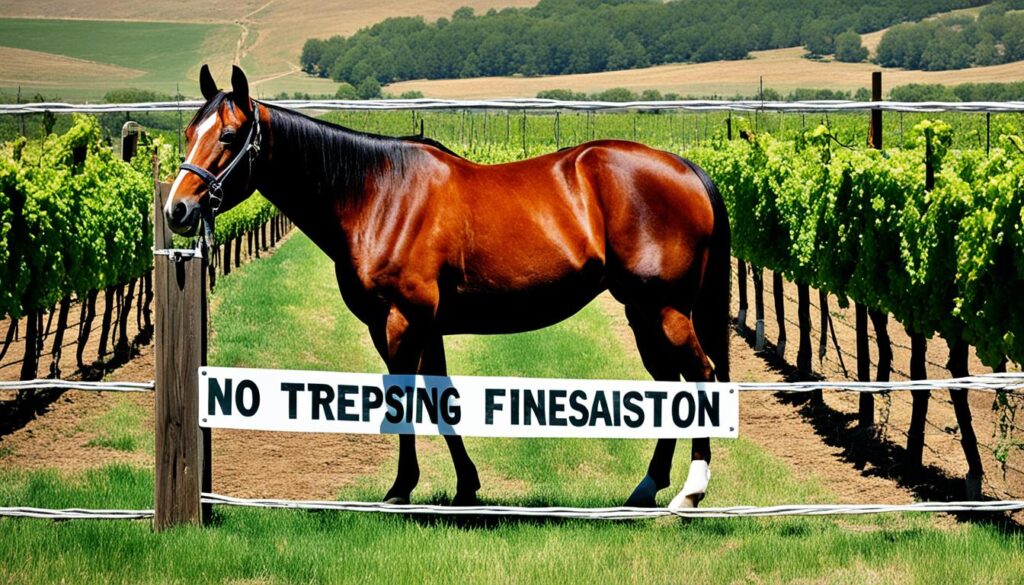
“Grapes and raisins can cause acute kidney failure in horses, so it’s crucial to prevent them from accessing these potentially deadly foods.”
By taking proactive steps to prevent grape ingestion in horses and responding quickly with appropriate equine emergency care if exposure occurs, horse owners can help safeguard the health and well-being of their equine companions.
Conclusion
While grapes may seem like an enticing snack for horses, the reality is that they can pose a significant health risk due to their toxic compounds, such as resveratrol. Horses have a unique digestive system that is not equipped to properly break down these substances, making grape ingestion a potentially life-threatening issue.
By understanding the dangers of grapes and other harmful foods, horse owners can take proactive steps to ensure their equine companions’ safety and maintain a balanced, nutritious diet that supports their overall health and well-being. This includes being mindful of the horse’s diet, equine nutrition, and grape safety for horses, as well as exploring horse-friendly treats that are safe and beneficial.
Ultimately, the key to a healthy, happy horse is to prioritize their specific dietary needs and avoid any potentially toxic or harmful foods, including grapes. By doing so, horse owners can foster a strong bond with their equine partners and contribute to their long-term well-being.



